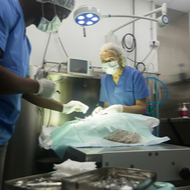Study reveals sustainable possibilities for veterinary anaesthesia

An online version of the study is available at Wiley.com
A study published in the Journal of Small Animal Practice (JSAP) has found that low flow anaesthetic techniques could significantly reduce greenhouse gas emissions and financial expenditure in veterinary practices.
The study. “Sustainable veterinary anaesthesia: single centre audit of oxygen and inhaled anaesthetic consumption and comparisons to a hypothetical model”, considers the way in which anaesthesia delivered via a circle system, lowering fresh gas flows, can reduce the carbon footprint of veterinary practices.
The study retrospectively reviewed records of one hundred consecutive anaesthetics from a typical week at the Queen Mother Hospital for Small Animals, RVC, UK. The study included cases in which the anaesthetic had an accompanying record of the animals' bodyweight and all the five minute recordings of fresh gas flows and vaporiser settings for the duration of the anaesthetic.
The anaesthetics in the study were reassessed to establish whether reductions could be made by utilising a conservative low-flow technique, and desflurane was swapped for an equipotent dose of sevoflurane when there was not a clear benefit to its use.
Study author, Matt McMillan, said: “All inhaled anaesthetic agents are greenhouse gases and by reducing the fresh gas flows we use as much as possible, through the utilisation of rebreathing systems, we can reduce the amount of them released into the atmosphere. Ultra-low flow anaesthesia may not be achievable in many situations but this study demonstrates that, by adopting a simple conservative-low flow anaesthetic technique, practices which routinely use non-rebreathing systems should be able to significantly reduce the carbon footprint of anaesthesia.”
Commenting on the importance of the work, McMillan said: “We often don’t think of the environmental impact of veterinary practice, but it can be extremely wasteful. Just like in every other aspect of modern life, we have a duty to reduce emissions of greenhouse gases to help slow climate change.”
The editor of JSAP, Nicola Di Girolamo, commented: “As veterinary professionals, we recognise the importance of protecting the environment and doing what we can to reduce our carbon footprint. This study was a good first step towards understanding the potential reductions in IAA consumption that can be made in veterinary practice.”
An early online version of the study is available at onlinelibrary.wiley.com It is open access and can therefore be freely accessed by anyone.



 The Veterinary Medicines Directorate (VMD) is inviting applications from veterinary students to attend a one-week extramural studies (EMS) placement in July 2026.
The Veterinary Medicines Directorate (VMD) is inviting applications from veterinary students to attend a one-week extramural studies (EMS) placement in July 2026.